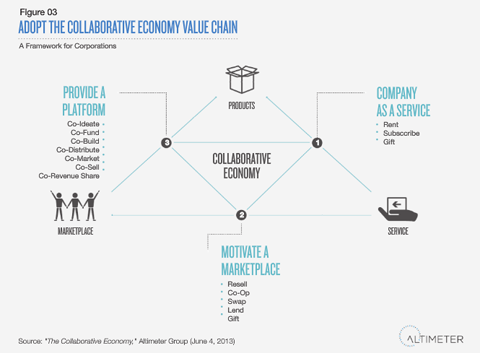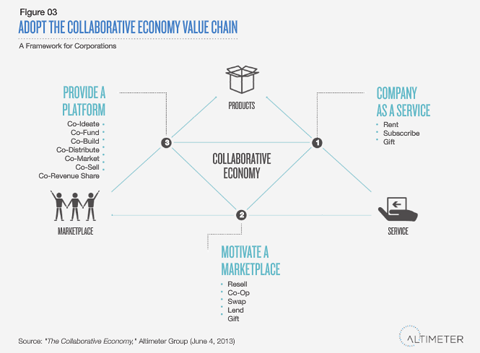With the sharing economy gaining more and more steam, major corporations can either hop on board or get run right over… or so says a new report from the Altimeter Group. Collaborative consumption has proven to be a lasting, widespread, and disruptive movement, which is why a number of forward-thinking companies — including Patagonia, Toyota, and NBC — have already begun incorporating sharing-based strategies into their core businesses. As the report notes, "Companies risk becoming disintermediated by customers who connect with each other. The Collaborative Economy Value Chain illustrates how companies can rethink their business models by becoming a Company-as-a-Service, Motivating a Marketplace, or Providing a Platform. The forward-looking company employs one model; the most advanced companies employ all three, with the corporation at the center."
At the heart of the collaborative economy are companies and projects that sprung from variations on the peer-to-peer sharing theme. Cars, food, services, bikes, housing, information, technology, and more — they can all be shared. Following the Field of Dreams tactic of "If you build it, they will come," these early adopters were soon joined by legions of first followers and, later, investors. Now, big corporations want in.

This year, we’ve seen Mutual Aid in Motion.
From scaling sharing hubs to Mutual Aid 101 trainings, we’re helping communities build the tools they need.
Every dollar fuels lasting resilience – proving that when we move together, we all move forward.
The rise of the Collaborative Economy is driven and enabled by the market forces that are converging now. As these trends accelerate, so too will the Collaborative Economy. In our research, we found that the following drivers:
Societal
- Increasing Population Density
- Drive for Sustainability
- Desire for Community
- Generational Altruism
Economic
- Monetize Excess or Idle Inventory:
- Increase Financial Flexibility
- Access Over Ownership
- Influx of VC Funding
Technology
- Social Networking
- Mobile Devices and Platforms
- Payment Systems
Harnessing the power of those drivers demands that existing companies rethink their business models and incorporate one or more of the three collaborative frameworks. In doing so, they can evolve alongside their customers and clients rather than be outpaced by them. The value-added rewards, it seem, are built in: "These three models represent increases in maturity — requiring greater investment that results in greater benefit at each level." Two examples of major corporations being light on their feet finds Toyota now renting cars from selected dealerships and Citibank sponsoring New York City's Citibike bike-sharing program.

In a nutshell, the take-away for corporations is this: "Relationships with customers have changed; Let go of your company to gain the market."
All companies are impacted; some will be severely disrupted.
- Companies with high cost, low usage, or easily transferable goods are most disrupted.
- There are many ways collaboration can occur.
- Startups seek to enable customers to buy once, share many.
Companies risk being disintermediated as customers monetize their assets and compete directly.
- Crowds will act like companies — providing and consuming goods and services amongst each other.
- Customers will seek products that are more durable or maintain their value.
The customer experience will extend past the first purchase, as customers share their goods.
- Customer experience extends on re-usage market.
- Customers trust each other more than brands — putting advocates center stage.
Internally, companies will also adopt these same on-demand and sharing services.
- A porous workforce redefines employer and employee roles.
- Offices can be anywhere, enabling the “pop-up company.”
- The difference between employees and customers blurs.
Altimeter Group's Methodology
The Collaborative Economy is a broad trend that impacts every sector of society, business, and government. While we factor these impacts into our analysis of this disruption, our primary focus is the impact on corporations and defining the opportunities it creates. This report is based on:
- Interviews with 35 startups, investors, brands, and thought leaders who are actively contributing to the definition of this nascent market. Altimeter conducted these interviews from February to May 2013.
- Analysis of industry trends across a database of 200 sharing startups in the space.
- In addition, Altimeter tested the thesis and assertions presented in this report with 34 executives and industry leaders.

